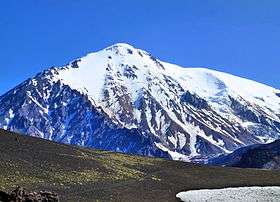Tolbachik
| Tolbachik | |
|---|---|
 Ostry Tolbachik from Southwest | |
| Highest point | |
| Elevation | 3,682 m (12,080 ft) |
| Prominence | 2,190 m (7,190 ft) [1][2] |
| Listing | Ultra |
| Coordinates | 55°49′51″N 160°19′33″E / 55.83083°N 160.32583°ECoordinates: 55°49′51″N 160°19′33″E / 55.83083°N 160.32583°E [1] |
| Geography | |
 Tolbachik Location on Kamchatka Peninsula, Russia | |
| Location | Kamchatka, Russia |
| Geology | |
| Mountain type | Shield volcano and stratovolcano |
| Last eruption | 2012 to 2013 |
| Climbing | |
| Easiest route | basic rock/snow climb |
Tolbachik (Russian: Толбачик) is a volcanic complex on the Kamchatka Peninsula in the far east of Russia. It consists of two volcanoes, Plosky (flat) Tolbachik (3,085 m) and Ostry (sharp) Tolbachik (3,682 m), which as the names suggest are respectively a flat-topped shield volcano and a peaked stratovolcano.[3] As Ostry is the mountain's highest point, the entire mountain is often referred to as "Ostry Tolbachik", not to be confused with Ostry, a separate volcano to the north also on the Kamchatka Peninsula.
Activity
Its eruptive history stretches back thousands of years, but the most notable eruption occurred in 1975, commonly known as "The Great Tolbachik Fissure Eruption". It was preceded by an earthquake swarm, which led to a successful prediction of the eruption by scientists from the Russian Institute of Volcanology. The eruption created several new cinder cones, and in terms of volume of lava emitted, was Kamchatka's largest basaltic eruption in historic times.
On November 27, 2012 a strombolian type eruption started from two fissures. Basaltic lava flows move relatively fast, and quickly flooded buildings 4 km away. The eruption continued for more than a month, as lava continued to flow from the fissures.[4][5][6] Lava flowed up to 20 kilometers (12 miles) from the line of fissures on the volcano’s southern flank. This satellite image was collected on December 22, 2012. According to the Kamchatka Volcanic Eruption Response Team (KVERT), the eruption is ongoing.
Mineralogy
The fumarole deposits of Tolbachik are rich in exotic minerals and 54 were first described from here including alarsite and tolbachite.[7]
Views



See also
References
- 1 2 "Russia: Kamchatka and the Russian Pacific Islands Ultra-Prominence Page" Peaklist.org. Listed here as "Mt. Ostry Tolbachik". The prominence value given here (2,190 m) is based on a summit elevation of 3,672 m. Retrieved 2011-11-26.
- ↑ "Mount Ostry Tolbachik, Russia" Peakbagger.com. The prominence value given here (2,190 m) is based on a summit elevation of 3,672 m. Retrieved 2011-11-26.
- ↑ "Tolbachik" summitpost.org. Retrieved 2011-11-26.
- ↑ Edwards Ben, Belousov Alexander, Belousova Marina, Volynets Anna, Melnikov Dmitry, Chirkov Sergey, Senyukov Sergey, Gordeev Evgenii, Muraviev Yaroslav, Izbekov Pavel, Demianchuk Yury (2013) Another “Great Tolbachik” Eruption? // Eos, Transactions American Geophysical Union. V. 94, № 21. P. 189-191. - ISSN Print: 00963941. - doi: 10.1002/2013EO210002.
- ↑ Volynets Anna, Melnikov Dmitry, Yakushev Anton, Tolstykh Maria (2013) Petrology and geochemistry of the New Tolbachik Fissure Eruption volcanic rocks and their evolution during the first two weeks of eruption // IAVCEI 2013 Scientific Assembly, July 20–24, Kagoshima, Japan. P. 743.
- ↑ Volynets A. O., Melnikov D. V., Yakushev A. I. (2013) First data on composition of the volcanic rocks of the IVS 50th anniversary Fissure Tolbachik eruption (Kamchatka) // Doklady Earth Sciences. V. 452, № 1. P. 953-957. doi: 10.1134/S1028334X13090201.
- ↑ "Tolbachik volcano". Mindat. Retrieved 12 January 2013.
- ↑ NASA - Activity at Kliuchevskoi
Other references
| Wikimedia Commons has media related to Tolbachik volcano. |
- Global Volcanism Program
- Plosky Tolbachik volcano and Tolbachik lava field
- Fedotov S.A. and Markhinin Ye.K. (Eds) (1983). The Great Tolbachik Fissure Eruption: Geological and Geophysical Data, 1975-1976. Cambridge University Press, 341 p. ISBN 0-521-24345-9
- "Fireworks" on Tolbachik - may 2013 on author's project website: "Russia Begins Here"